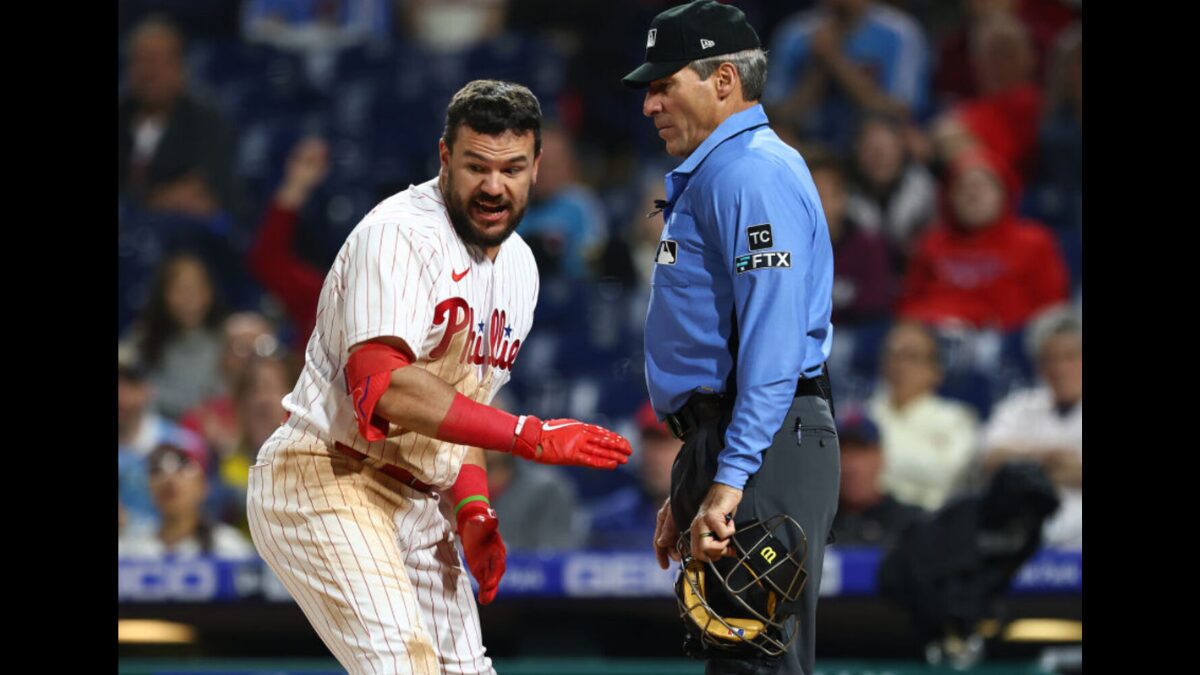Human error has been a part of sports for as long as sports have been played. There’s no way around it. Games played by people, naturally will result in such. Players make mistakes, they aren’t trying to, but they do anyway. A groundball got by Bill Buckner. Jim Marshall ran the wrong way. It happens. Players get booed and are in the spotlight because people pay good money to watch them do what they do. When it comes to an umpire, referees and officials, there’s never a home game, and nobody is paying to watch you ump, ref or officiate.
There have been notable ‘missed’ calls over the years. Umpire Jim Joyce incorrectly called a runner safe at first base, ruining Armando Galarraga’s perfect game bid. The late Don Denkinger made an incorrect safe call at first, during the 1985 World Series, sending the Royals to an improbable win over the Cardinals for the championship. Those calls weren’t challengeable back then.
Media and technology have made protagonists of officials all across the sports landscape. Making household names of people like Angel Hernandez, CB Bucknor and Hunter Wendelstedt. That shouldn’t be the case, but some of those calling balls and strikes seem to relish their ‘I’m in charge, what I say goes, how dare you question me’ place in the game. “K-Zone” has exposed many of them, as has super slomo instant replay. The result? Fans, players and broadcasters alike are filled with consternation and frustration.
Many times, it spills over to a baseball or football broadcast. Announcers are the voice of the fans and sometimes just can’t hold back. Why? Because you like your team and want to see them do well. You know what you see. Emotions can get the best of you. Watching players that you know pretty well react the way they do to a bad call can unlock feelings inside you as the announcer. How you react is how the fans will perceive that call and the umpire’s competency.
Recently, Hernandez, Bucknor and Wendelstedt have been in the spotlight for controversial calls behind home plate.
Hernandez has been a target of the media, fans and players for quite some time. He hasn’t helped himself during games, routinely getting calls incorrect. The announcers for the Texas Rangers were beside themselves with Hernandez’s inconsistent strike zone in an April game.
The defending World Series champions were up on the Astros 8-1 in the top of the fourth when Texas loaded the bases for rookie Wyatt Langford. Hernandez called a pretty obvious 2-0 pitch a strike despite it being outside the zone. Astros pitcher J.P. France then threw nearly the exact same pitch in the same spot a couple of times and that was enough for the Rangers’ booth.
“You have got to be kidding me!” said Rangers Bally Sports Southwest play-by-play announcer Dave Raymond. “What in the world?!”
“This is just bad,” analyst Dave Valle said. “Three consecutive pitches well off the plate.
“That’s just so obvious. That was terrible.”
Ok. I don’t have a problem with that commentary at all. It never got personal, though it easily could have, and the proof of what Raymond and Valle are saying, is right there for all to see. The pictures don’t lie and neither can the broadcaster.
Bucknor evokes the same kind of ire from fans, players and broadcasters as Hernandez does.
Jim Palmer, a Hall of Fame pitcher for the Orioles is an analyst on the Birds television broadcast. Even he couldn’t hold back, when Bucknor made a questionable call on a Nestor Cortes pitch to Adley Rutschman.
“You kind of wonder how bad he’s gonna be and he’s shown us already in the first inning. This ball’s a grounder.” Palmer exclaimed. “He shouldn’t be umpiring, and he is,” he added. “They know it. It’s kind of like pitching — when I couldn’t get people out, I became a broadcaster.”
Palmer isn’t wrong exactly. He has seen his fair share of good umpiring and bad over the course of his long baseball career. This one gets a little personal but Palmer couches it all by using a little self-deprecation to ease the blow a bit.
Bucknor drew the ire of the Cardinals television crew last weekend in the game between the Cards and White Sox. With one out to go in the bottom of the 10th, the Sox leading 6-5, it started pouring and the game was delayed. 3 hours and 3 minutes later, the game resumed and took less than a minute to complete, ending on a Bucknor called third strike that K-Zone had well off the plate outside.
The Cardinals TV announcers were shocked to say the least by Bucknor’s call.
“You’ve got to be kidding me. After all of that, he’s gonna call a pitch off the plate,” one of the broadcasters said right after the call.
It certainly isn’t a good look for Major League Baseball and these announcers are just doing their jobs. They are calling the action as they see it. As their viewers can see it. There’s no hiding the bad call and it can’t be ignored.
But it also can’t take over your broadcast. Veteran announcers are well aware of this, even if it can be tough advice to follow at times. Younger announcers need to realize that criticizing officiating or umpiring again and again can reflect poorly on you. There is no way you want to become known as the one constantly criticizing every play. It happened to me earlier in my career. Ripping refs during college basketball games was commonplace in my broadcasts, the fans told me how much they loved it. Administration had other thoughts and passed along a sort of cease-and-desist order to me. I needed it. Listening back to some of those early games makes me cringe.
Networks now employ former referees, umpires and officials to alleviate the burden of questioning calls from the announcer. The ‘expert’ can shed light on what the official saw and what the correct ruling should or shouldn’t be. Local broadcasts don’t have that luxury, so the viewer depends on you, the announcer, to be aware of the rules and be the interpreter for the audience. Nothing worse than an announcer ‘going off’ on an umpire without direct knowledge of the rules of the game. You have to know the specific rule before you can really question the call with some credibility.
Here are some things to keep in mind as you are calling a game that has a bad call, or a few bad calls.
BE HONEST BUT BE RESPECTFUL
As I pointed out, criticism of a bad call is ok at times as long as you keep it to the call rather than the person making it. Very few situations call for getting personal about the umpire or referee. You wouldn’t rip one of the players you cover, personally, for making an error, would you? The same should apply to the official. Human beings do after all make mistakes.
Until you get a better look at the play, you can certainly ‘couch’ your analysis of a bad call.
“They are a lot closer to the play than we are…”, “Smith has a great curveball, so great it may have fooled not just the batter but the ump…”. “That pitch just missed, could have gone either way.” Just a couple of examples of how you can get around it, at least to start.
In the honesty department, during last year’s Super Bowl, Fox analyst Greg Olsen reacted to a late holding call, by saying, “I don’t love that call.” His credibility, just like in an earlier example with Jim Palmer, Olsen has been on the field and has the credentials to call it out. It wasn’t a heated statement. It was pretty matter of fact and focused on only the call.
These officials are not trying to be bad, keep that in mind as well. You have benefit of time, to review the play, they don’t. Also, what these men and women do is difficult. It’s not an easy job. Be mindful of that as well.
RELY ON YOUR EYES AND REPLAYS
Players are always going to react to calls in demonstrative fashion. Don’t let that fool you about whether or not a call is correct. Rather you should describe to your audience that “player X is really hot about that call, feeling like he beat the throw.” Players are often wrong and get caught up in the moment, especially if it’s a tight game. Don’t let that happen to you on the air.
REVISIONIST HISTORY IS NOT A THING
”If that call wasn’t made…look what would have happened…” Ok, stop right there. So, your player gets picked off 2nd and it looks like a bad call and the next guy up singles. How do you know what would have happened next had the call gone your way? The pitch sequence may have been a lot different with the bases empty as opposed to a man on second base. Right? It’s too easy a crutch to blame the call or lack thereof for missing out on a run.
DON’T DO THIS
The other thing you should never do, is to blame the outcome of a game on the umpires or officials. Yeah, ok, sometimes it appears that way, but it’s never the case. Players after the game will tell you of missed opportunities in innings before the ‘bad call’ happened as a reason for a loss. It’s a dangerous slope to slide down, so be careful.
These days, bad calls are magnified immediately thanks to social media. Don’t pile on, leave that to the internet umpires and refs. Just do your job and all will be good in the end.
Andy Masur is a columnist for BSM and works for WGN Radio as an anchor and play-by-play announcer. He also teaches broadcasting at the Illinois Media School. During his career he has called games for the Chicago Cubs, San Diego Padres and Chicago White Sox. He can be found on Twitter @Andy_Masur1 or you can reach him by email at Andy@Andy-Masur.com.







